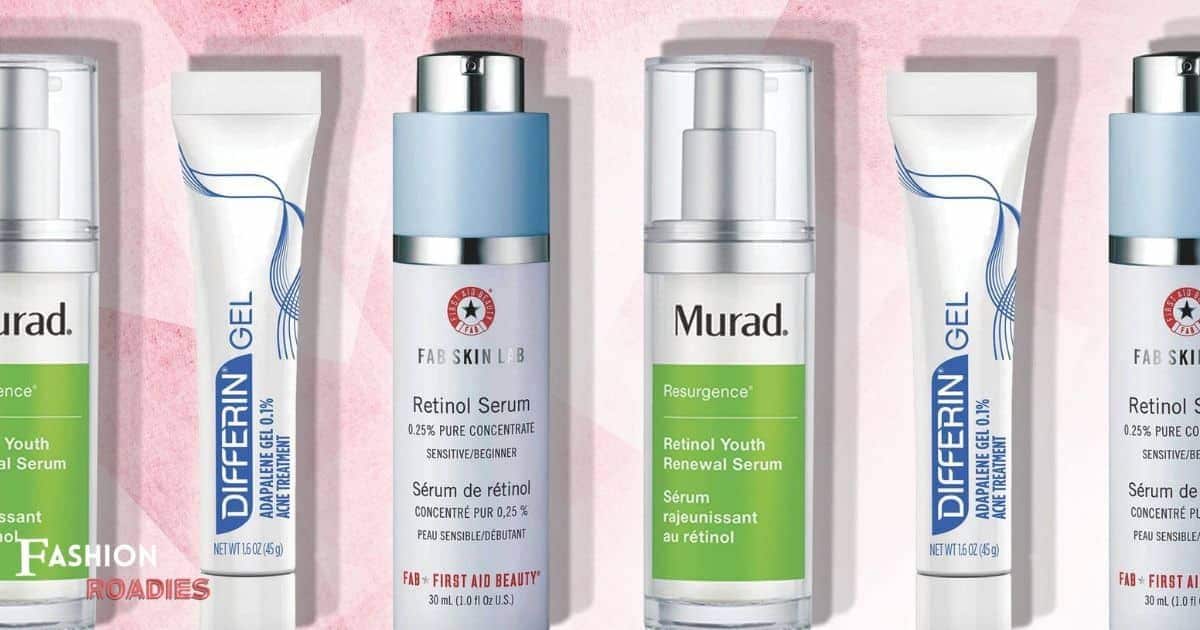Unlock the secrets to radiant, youthful skin with the power of retinol. Often referred to as the “gold standard” in skincare, retinol is a scientifically proven ingredient that boasts a multitude of benefits. From reducing fine lines and wrinkles to improving skin texture and tone, retinol has become a must-have in any effective skincare routine. In this article, we will delve into the fascinating world of retinol, exploring its mechanisms, types of products available, and how to incorporate it into your daily regimen. Join us on this journey to uncover the transformative potential of retinol for your skin.
Key Takeaways
- Retinol is a derivative of vitamin A that enhances cellular turnover and collagen production.
- Using retinol in your skincare routine can improve skin texture, tone, and reduce the appearance of wrinkles and fine lines.
- Retinol promotes enhanced skin renewal by increasing cell turnover and stimulating collagen production.
- There are different types of retinol products available, such as creams and serums, which are suitable for different skin types.
The Science Behind Retinol
The latest research has revealed the remarkable effects of retinol on cellular turnover and collagen production, providing a deep understanding of the science behind this powerful skin care ingredient. Retinol, a derivative of vitamin A, has been extensively studied for its numerous benefits in promoting healthier skin. One of the key benefits of retinol is its ability to enhance cellular turnover, which refers to the process of shedding dead skin cells and replacing them with new ones. This process helps to improve the overall texture and tone of the skin, giving it a smoother and more youthful appearance. Additionally, retinol stimulates collagen production, a vital component for maintaining the skin’s elasticity and firmness. The efficacy of retinol in reducing the appearance of wrinkles and fine lines has been well-documented, making it a popular ingredient in anti-aging skincare products. Its ability to improve skin texture, promote collagen production, and reduce signs of aging make retinol a highly effective ingredient in skincare routines.
Benefits of Using Retinol in Your Skincare Routine
Using retinol in your skincare routine can provide numerous benefits. Retinol enhances skin renewal by increasing cell turnover, resulting in a smoother and more youthful complexion. It also reduces the appearance of fine lines, wrinkles, and age spots, making it a valuable ingredient for anti-aging skincare.
Enhanced Skin Renewal
Enhanced skin renewal can be achieved by incorporating retinol into your skincare routine. Retinol, a derivative of vitamin A, is a powerful ingredient known for its ability to promote cell turnover and stimulate collagen production in the skin. When applied topically, retinol penetrates the skin and accelerates the shedding of dead skin cells, allowing for the regeneration of new, healthier cells. This process helps to improve the texture and tone of the skin, reduce the appearance of fine lines and wrinkles, and even out skin discoloration. Additionally, retinol stimulates collagen production, which is essential for maintaining skin’s elasticity and firmness. By incorporating retinol into your skincare routine, you can enhance your skin’s natural renewal process and achieve a more youthful and radiant complexion.
Reduced Signs of Aging
Incorporating retinol into your skincare routine can lead to reduced signs of aging, such as improved skin texture and diminished fine lines and wrinkles. Retinol, a derivative of vitamin A, is a powerful ingredient that has been scientifically proven to enhance skin rejuvenation. While retinol is widely regarded as an effective anti-aging ingredient, some individuals may prefer natural alternatives or retinol alternatives due to potential side effects or personal preferences. Fortunately, there are several options available for those seeking alternative solutions to address their concerns. These alternatives include botanical extracts, peptides, and antioxidants, which can provide similar benefits to retinol without the potential irritation or sensitivity. Understanding how retinol works to improve skin can further shed light on the effectiveness of these alternatives and help individuals make informed decisions about their skincare routine.
How Retinol Works to Improve Skin
Through its ability to stimulate collagen production, retinol enhances skin texture and reduces the appearance of fine lines and wrinkles. Retinol, a form of vitamin A, is a powerful ingredient in skincare products that has gained popularity for its anti-aging benefits. It works by increasing cell turnover, promoting the growth of new skin cells and shedding old ones. This process helps to improve the overall texture and tone of the skin. In addition to its anti-aging properties, retinol is also effective in treating acne. It helps to unclog pores, reduce inflammation, and regulate oil production, making it an excellent choice for those struggling with acne-prone skin. When choosing a retinol product, it is important to consider the concentration of retinol, as well as any potential side effects. Consulting with a dermatologist can help determine the right retinol product for individual needs and concerns.
Different Types of Retinol Products Available
When it comes to retinol products, there are different types available, including creams and serums. Creams are thicker and are often recommended for individuals with dry skin, while serums are lightweight and more suitable for oily or combination skin types. Additionally, there are over-the-counter options that can be easily purchased without a prescription.
Cream Vs. Serum
The efficacy of retinol in skin care can vary depending on whether it is applied in the form of a cream or a serum. Both creams and serums containing retinol have their own benefits and drawbacks. Here are some key points to consider when deciding between a retinol cream and serum:
- Creams are generally more emollient and hydrating, making them suitable for drier skin types.
- Serums are lightweight and easily absorbed, making them ideal for oily or combination skin.
- Retinol creams tend to be more stable and have a longer shelf life compared to serums.
When it comes to the best brands for retinol products, some popular options include:
- The Ordinary Retinol 1% in Squalane
- Paula’s Choice Clinical 1% Retinol Treatment
- SkinCeuticals Retinol 0.5 Refining Night Cream
It’s important to note that the efficacy of a retinol product is not solely dependent on the form it comes in, but also on the concentration, formulation, and individual skin type.
Over-The-Counter Options
Some of the most popular over-the-counter options for retinol products include creams, serums, and oils, each offering their own unique benefits. Retinol is a derivative of vitamin A and is known for its ability to improve skin texture, reduce the appearance of wrinkles, and promote collagen production. These over-the-counter options provide affordable alternatives to prescription-strength retinoids, making them accessible to a wider audience. Creams are often preferred by those with dry or sensitive skin, as they offer a moisturizing base. Serums, on the other hand, are lightweight and easily absorbed, making them ideal for oily or acne-prone skin. Oils are a popular choice for those looking to incorporate retinol into their nighttime skincare routine, as they provide deep hydration. Now, let’s explore some tips for incorporating retinol into your skincare regimen.
Tips for Incorporating Retinol Into Your Skincare Regimen
To optimize the effectiveness of retinol in your skincare routine, consider gradually introducing it into your regimen and monitoring any potential skin reactions. Retinol, a derivative of vitamin A, is known for its anti-aging benefits and ability to improve the overall appearance of the skin. Here are some tips for incorporating retinol into your skincare routine:
- Start with a low concentration: Begin with a low-strength retinol product to allow your skin to adjust. As your skin becomes more tolerant, you can gradually increase the concentration.
- Use it at night: Retinol is sensitive to sunlight, so it’s best to incorporate it into your nighttime skincare routine. This will also give your skin time to recover and regenerate while you sleep.
- Moisturize and protect: Retinol can cause dryness and sensitivity, so it’s important to moisturize your skin well and use sunscreen during the day to protect against harmful UV rays.
Potential Side Effects and Precautions of Retinol Use
A few possible side effects of retinol use include dryness, redness, and flaking, so it is important to start with a low concentration and gradually increase as tolerated. Retinol, a derivative of vitamin A, is a popular ingredient in skincare products due to its ability to improve the appearance of fine lines, wrinkles, and skin texture. However, it is important to be aware of its potential side effects and take necessary precautions to minimize any adverse reactions. To avoid dryness and irritation, it is recommended to use a moisturizer alongside retinol and apply sunscreen during the day as retinol can make the skin more sensitive to the sun. Additionally, pregnant women and those breastfeeding should consult with their healthcare provider before using retinol, as it may have potential risks for the fetus or infant.
Frequently Asked Questions
Can Retinol Be Used on All Skin Types?
Retinol can be used on all skin types, but caution should be exercised when using it on sensitive skin. Potential side effects, such as redness and irritation, may occur on certain skin types.
How Long Does It Take to See Results From Using Retinol?
The timeframe for seeing results from using retinol varies depending on factors such as skin type and the specific product used. However, with consistent use, retinol has been proven to be effective in improving skin texture and reducing the appearance of fine lines and wrinkles.
Can Retinol Help With Acne or Other Skin Conditions?
Retinol, a derivative of vitamin A, has been shown to effectively treat acne and other skin conditions. Its anti-inflammatory properties help reduce the appearance of blemishes, while its ability to stimulate collagen production provides anti-aging benefits.
Is It Safe to Use Retinol During Pregnancy or While Breastfeeding?
Using retinol during pregnancy or while breastfeeding is not recommended due to potential risks. It is important to prioritize the safety of the mother and baby. Consult with a healthcare professional for alternative skincare options.
What Is the Recommended Age to Start Using Retinol in a Skincare Routine?
The recommended age to start using retinol in a skincare routine is typically in the late twenties or early thirties, as this is when the signs of aging become more prominent. Retinol offers numerous benefits for aging skin, including reducing wrinkles and improving skin texture.
Conclusion
In conclusion, retinol is a scientifically proven ingredient that offers numerous benefits for the skin. It helps to improve skin texture, reduce the appearance of fine lines and wrinkles, and enhance overall skin tone. By incorporating retinol into your skincare routine, you can achieve smoother, healthier-looking skin. However, it is important to be cautious and follow proper usage guidelines to avoid potential side effects. With its powerful effects, retinol is a valuable addition to any skincare regimen.










